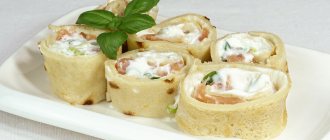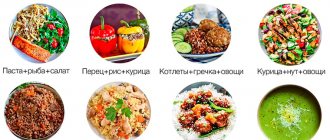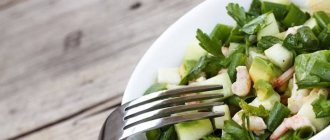Calculation of caloric content of a product per 100 grams
The calculation of the calorie content of 100 grams of product is based on previously known indicators of BZHU (abbreviation: proteins-fats-carbohydrates). The calculation method is the summation of these data (obtained by laboratory analysis and calculations) previously multiplied by a value equal to the energy released (calories) during their splitting. So, for example, 1 gram of protein or carbohydrate can release energy equal to 4.1 kcal, and fat a little more than 9. In calorie calculations, these numbers are usually rounded to whole numbers, as is the result itself.
Our example involves proteins - 12.7 grams, fats - 11.5 grams and carbohydrates - 0.7 grams contained in 100 grams of product. Next we perform the calculation:
Energy value of 100 grams = 12.7 (proteins)*4 + 11.5 (fat)*9 + 0.7 (carbohydrates)*4 = 50.8 + 103.5 + 2.8 = 157.1 kcal
Our calculated calorie content is more than 50, but less than 250 kcal, which means that a chicken egg is a medium-calorie product with a high content of proteins, fats and low carbohydrates.
Eggs in bodybuilding[edit | edit code]
How to separate whites from yolks
Modern egg production
Should you store eggs in the refrigerator?
Jim Stoppani on the benefits of eggs
Egg
- This is one of the cheapest and at the same time high-quality sources of protein used in bodybuilding and powerlifting. Whole egg whites have the highest digestibility and are considered the standard against which all other proteins are judged. A chicken egg consists of a protein, which is almost 100% albumin (ovoalbumin), and a yolk, which contains 7 different proteins: albumin, ovoglobulin, coalbumin, ovomucoid, ovomucin, lysocin, avidin.
One chicken egg contains:
- Protein - 6-7 g
- Carbohydrates - 0.5 g
- Fats - 4 g
- Choline (lecithin) – 150 mg
- Vitamins and minerals
Raw eggs[edit | edit code]
Eating large quantities of raw chicken eggs is not recommended, as they contain an inhibitor (a substance that significantly slows down the digestion process) of the digestive enzyme trypsin. Moreover, the avidin peptide contained in the protein blocks vital biotin (vitamin H), forming a strong complex that is not digested or absorbed by the body. Therefore, it is recommended to consume chicken eggs only after heat treatment (at 70°C the trypsin inhibitor is destroyed, and at 80°C active biotin is released from the biotin-avidin complex).
Research[edit | edit code]
- One egg a day can reduce the risk of stroke.[1]
Eggs and cholesterol[edit | edit code]
Japanese and Taiwanese scientists decided to find out the effect of egg white on the human body. Three groups of female volunteers participated in the experiment. All of them were practically healthy, but with elevated cholesterol levels in the blood. The subjects ate diet-prepared food at a rate of 1,750 kilocalories per day with a daily intake of 70 grams of protein. Fat in the subjects' diet accounted for 20 percent of total calories. The first group got 30 percent of their protein from egg whites, the second group from cheese, and the third from soy cheese. Body weight and daily exercise remained constant throughout the study. As it turned out as a result of the experiment, in the groups that received protein from egg whites and soy cheese, the total cholesterol level decreased, and in the first group, in addition, the level of “good” lipoproteins increased. In the second group, which received cheese, their blood cholesterol levels increased.
Should you eat yolks[edit | edit code]
Another study published in the Annals of Nutrition and Metabolism in 1996 found that eating eggs throughout the day lowered levels of high-density lipoprotein, which lowers cholesterol and prevents the development of atherosclerosis. Although at first glance this indicates that eggs are not that healthy, a closer look reveals a simple solution. The negative effects of eating eggs are associated with increased oxidation, which is favored by eating whole eggs due to their high polyunsaturated fat content. Polyunsaturated fats are especially prone to oxidation, including the much-touted omega-3 fats found in fish and flaxseed oil. However, you can easily prevent increased fat oxidation simply by consuming antioxidants. They include vitamins C, E, PP, selenium and beta-carotene. Such natural antioxidants stabilize polyunsaturated fats, preventing oxidation.
This is all theory, but how does it work in practice?
90% of bodybuilding athletes are under 30 years of age and do not have problems with high cholesterol levels in the blood; these factors almost completely eliminate the possibility of pathological changes in fat metabolism, expressed in hypercholesterolemia. In addition, cholesterol is an integral part of cell membranes, and in a growing body, a lack of cholesterol is fraught with inhibition of physical development and other problems. And since bodybuilding primarily involves increasing muscle mass, cholesterol costs will be higher than in the population. In addition, egg yolk is rich in lecithin, a source of essential phospholipids that are involved in the transport of fats, cleanse blood vessels of cholesterol plaques, destroying LDL, and are needed for the production of HDL. As a result, cholesterol unused by cells returns to the liver and the production of new cholesterol decreases. Therefore, eggs not only do not increase the amount of cholesterol in the body, but help reduce it. And most importantly, every bodybuilder should include additional vitamins in his diet. As mentioned above, vitamins A, C and E have pronounced antioxidant properties, which ensure almost complete safety of eating whole eggs. As for fats, when gaining body weight, their amount will not affect the overall results, since their relative content is small. Do not forget that the yolks contain a large amount of vitamins, microelements and bioactive substances.
Thus, it becomes clear that eating whole eggs for bodybuilding is not only not dangerous, but also useful, especially when gaining weight. If you are losing weight, you should give up the yolk, but definitely include protein in your diet.
How to cook eggs[edit | edit code]
Eggs can be hard-boiled or soft-boiled, fried, cooked in an omelet, or added to other dishes. But with powerful heat treatment, most of the beneficial properties of the egg are simply lost, and the boiled yolk is digested in the stomach for about 3 hours. The best way to prepare eggs for bodybuilding is to soft-boil them. It is believed that almost 100% of the nutrients are absorbed from it, and it is digested in about 1.5 hours. Read the cooking recipes.
General conclusion[edit | edit code]
Eggs are one of the healthiest foods in bodybuilding. Try to eat heat-treated eggs - this improves their absorption and also eliminates the risk of salmonellosis. A healthy athlete can consume 6-8 whole chicken eggs per day without risk to health, and the amount of egg white is not limited. If you have high cholesterol levels, skip the yolks.
Egg whites in sports nutrition[edit | edit code]
For the production of nutritional supplements, both whole egg white and separately egg albumin are used. Sports nutrition made on the basis of egg whites is devoid of all the disadvantages of whole eggs, while completely preserving their beneficial qualities, so the latter is considered one of the highest quality and most effective in all respects. Relatively slow absorption makes it possible to consume egg whites while losing weight, without fear of slowing down the weight loss process.
Egg consumption by professional bodybuilders[edit | edit code]
| BODYBUILDER | NUMBER OF EGG WHITES PER WEEK | FAVORITE EGG WHITE DISH |
| Jay Cutler | 170 pcs.(twice a day) | Omelette with low-fat cheese and vegetables |
| Eddie Robinson | 190-240 pcs. | Omelette, hard-boiled egg whites, or oatcakes. Scones recipe: 400 g egg whites, 1 cup oatmeal, 1/2 tsp. cinnamon, 1 tsp. berry jam. Mix everything and put it in the mold. Makes 2 flatbreads |
| Chris Cormier | 170 pcs. There was a time, I was on a crazy diet - 110 egg whites a day (not recommended) | Omelet with low-fat cheese and pieces of beef |
| Dennis Newman | 150 pcs. | Pancakes: Mix 10 egg whites, 1 cup oatmeal and mashed half a banana. Bake in a pancake maker or non-stick frying pan (without oil) |
| Gunther Schlierkamp | 100 pieces. in the off-season, before competitions does not use | Omelet with onions, mushrooms, tomatoes, low-fat cheese and seasonings (pepper, garlic salt, dry parsley, basil) |
| Dorian Yates | 160-170 pcs. | Mixed with oatmeal and bananas |
| Mike Francos | 210 pcs. in the off-season, 560 pcs. before the competition | Oatmeal pancakes: 18 egg whites, 2.5 cups oatmeal, 1 mashed banana, sugar substitute, raisins, a little salt. Mix thoroughly and bake like regular pancakes. Serves 2 |
| Laura Creaval | 40 pcs. | Omelet with low-fat cheese |
Calorie calculation for a 40 gram serving
As an example, we will give the calculation of a portion equal to 40 grams - this is one of the standard weight measures that is popular. Its calorie content can be calculated by simple calculation.
The easiest and most versatile option (suitable for calculating any volume of a product or ready-made dish) is calculation by multiplying the known calorie content (100 grams) by a factor of 0.4 obtained from division (40 / 100 grams).
Calorie content of a 40 gram serving = 157 * 0.4 = 62.8 kcal.
Compound
On average, one raw egg weighs about 45 grams and its calorie content is 75 kcal.
In this case, the protein has the following composition:
- water – 87%;
- proteins – 11%;
- carbohydrates – 1%;
- minerals – 1%.
Video
Yolk composition:
- water – 50%;
- fats – 31%;
- proteins – 17%;
- minerals – 2%.
It is also worth noting that they contain a high content of phosphorus, calcium, sodium, potassium, iron, zinc and selenium.
In addition, they are rich in vitamins:
- A;
- AT 3;
- AT 4;
- AT 6;
- AT 12;
- D;
- E;
- RR;
- TO;
- biotin;
- folic acid.
Video
Vitamin content
Table 1
| Vitamins | Content | Daily norm |
| A (retinol) | 260 mcg | 26 % |
| E (α-, β-, γ-tocopherols) | 0.6 mg | 6 % |
| D (lamisterol) | 2.2 mcg | 88 % |
| B1 (thiamine) | 0.07 mg | 4.67 % |
| B2 (riboflavin) | 0.44 mg | 24.44 % |
| B3 (PP) (nicotinamide) | 3.6 mg | 18.95 % |
| B4 (choline) | 251 mg | 50.2 % |
| B6 (pyridoxine) | 0.14 mcg | 7 % |
| B9 (folacin) | 7 mcg | 3.5 % |
| B12 (cobalamin) | 0.52 mcg | 17.33 % |
A chicken egg contains vitamins with high, medium and low levels, if we consider them according to the approved standards for the significance of the nutritional value of the product.
At the highest level of importance in the food value chain are:
- A, takes part in all functions of the body related to its growth and proper metabolism, preserves the structure of the cornea of the eye.
- D, takes part in the formation of bone and dental tissue.
- B2, maintains body tone.
- PP, participates in the formation of hemoglobin.
- B4, is involved in the biosynthesis of heme and proteins, cell proliferation, and tissue respiration.
- B12 is involved in many metabolic processes in the body.
Vitamins at a medium level of importance include:
- E, keeps the muscular system in good shape.
- B6, participates in the metabolism of lipids and amino acids.
Vitamins of low content include:
- B1, required to normalize the nervous and muscular systems.
- B9, supports the hematopoietic and digestive system.
Eggs: harmful to health[edit | edit code]
Posted by Dietitian Joel Fuhrman
Modern research has found that high consumption of eggs can lead to diabetes, cardiovascular disease and prostate cancer. Eggs are high in cholesterol, and high cholesterol levels reduce your body's tolerance to glucose and pancreatic function, leading to diabetes and, in people who already have diabetes, leading to premature death. The Physicians' Health Study, for example, documented a 23% increase in mortality rates from eating more than one egg per day. These negative effects were significantly higher in diabetics. A prospective study of healthcare workers found that people who ate more than one egg per week significantly increased their risk of developing diabetes. People who eat more than seven eggs a week increase their risk by 58%. If a person already has diabetes, the mortality rate doubles if the person consumes more than seven eggs per week. Similarly, a Greek study of diabetics reported a fivefold increase in the risk of mortality due to cardiovascular problems in people who ate at least one egg per day.
Eggs are also rich in choline, which, like cholesterol, is present in high concentrations in prostate cancer cells. A 2011 study that followed 27,607 men from 1994 to 2008 found that those who ate two and a half or more eggs per week had an 81% increased risk of prostate cancer compared to men who ate less than half an egg. in Week. A prospective study of health care workers observing egg consumption in 47,896 men confirmed these findings. Men whose choline levels were highest had a 70% increased risk of prostate cancer.
Other studies have found that choline is involved in the growth and development of cancer. For example, in the highly respected US Nurses' Health Study, increased choline was associated with an increased risk of developing colorectal adenoma. A 2012 study identified a link between egg yolk consumption and carotid artery platelet counts in more than twelve hundred people. Platelet development in the blood vessels increased in proportion to the amount of egg yolks consumed. People with the highest egg consumption performed as well as if the study participants were smokers. People who ate the most egg yolks (an average of about four per week) showed two-thirds of the plaque formation in their carotid arteries, which is comparable to smokers who smoked a pack of cigarettes a day for forty years!
One after another, studies continue to show that egg yolks are not as harmless as everyone used to think. In fact, they pose a particular risk for people who are overweight, prediabetic, or diabetic.
Product digestibility
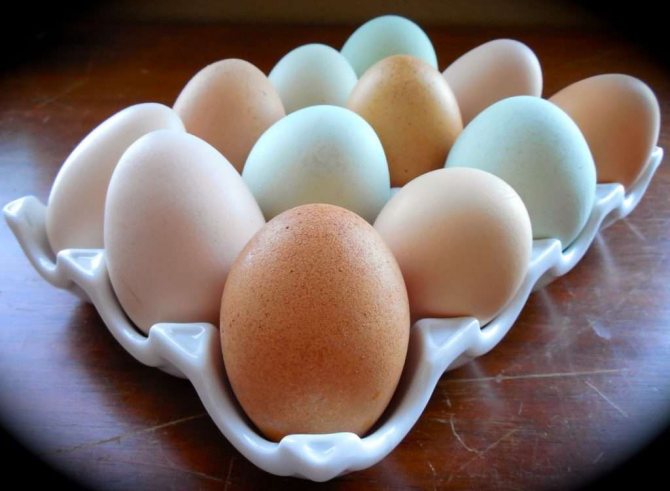
Depending on the method of preparing eggs, their digestibility is different in each case. If you pay attention to the opinions of experts, some consider boiled eggs more useful, while others insist on eating them raw.
Each of the opinions is considered correct in its own way. The product is well absorbed by the body in both cases, with only some differences:
- Having a low calorie content, a boiled or fried egg is well absorbed by the body . In the process of breaking down the product in this form, enzymes that break down fats are synthesized in the body. For this reason, many athletes consume a boiled egg after training;
- raw eggs enrich the body with the beneficial substances it needs, but only in cases where there are no other products in the dish. If at the time of eating an egg there is no deficiency of minerals and vitamins in the body, then it is simply not digested in the stomach and is excreted from the body.
Interesting! Regular consumption of raw eggs by women increases the opportunity to become pregnant, carry and give birth to a healthy baby.
Diet food and chicken eggs
Dietary nutrition can have different directions.
The diet consists of:
- for weight loss;
- for the treatment of acute and chronic diseases;
- to create an optimal diet taking into account age, body weight, presence/absence of physical activity - lifestyle.
Dietary nutrition is recommended not only for overweight people, but also for patients with diseases of the gastrointestinal tract, urinary system (namely kidneys), and liver. Chicken egg yolks are excluded from the diet for people with high cholesterol. You can only eat protein.
Chicken eggs are especially recommended for people with gastrointestinal diseases. Such patients are recommended to drink a raw chicken egg once a week. But only a gastroenterologist can give accurate recommendations on this issue.
For people with kidney disease, the presence of protein in the diet is, on the one hand, limited, but on the other hand, it is maintained . On average, the diet should contain about 35 g of protein.
Excess protein leads to the formation of toxins (all such compounds contain nitrogen, and protein is built from nitrogenous bases) and difficulty in kidney function. But at the same time, protein is necessary for the construction of new cells, and therefore it cannot be completely excluded. Optimally, you can consume 1-2 eggs per week.
A diet designed for weight loss may contain chicken eggs. For more information about the permitted amount of the product, please consult your dietitian.
Egg omelet
A fairly common breakfast dish is omelet. It's very easy to prepare. To do this, thoroughly beat the eggs with milk until smooth. Preheat the frying pan, pour a little sunflower oil into the bottom and pour out the prepared mass. If you prepare an omelet from two eggs, its nutritional value will reach up to 118 kcal. When you use only proteins for cooking, the number of calories in the finished dish will be reduced to 85.
Often, for variety, other products are also added to the omelette, which also largely determine its nutritional value.
If, for example, an omelette is prepared with cheese and tomatoes, then the number of calories in the finished dish reaches up to 342.
Speaking about the omelet, it should be noted that such a breakfast is considered very healthy; it fills the body with the necessary energy for the whole day.

How to determine freshness
Even eggs that are fresh by their expiration date can be spoiled due to improper storage in the store. The easiest way to determine the freshness of eggs is to immerse them in water.
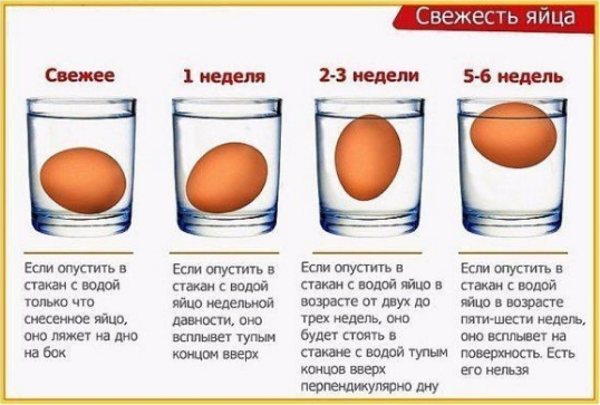
Fresh eggs drown in water . Eggs of medium freshness float in the water on their side, but do not rise to the surface. A spoiled egg floats on the surface of the water and does not sink; such a product should not be consumed.
Egg diet. Menu for the week
If you stick to the egg diet for 7 days, you can lose up to 5 kg of body weight. One of the advantages of the egg diet is that eggs are digestible by approximately 95-97% and suppress hunger for a long time. The egg diet is not an example of a mono-diet (a diet based on the consumption of one product), it is a low-calorie protein diet.
The egg diet, according to nutritionists, is the most effective and safe, because eggs have sufficient calorie content and contain a large amount of nutrients.
The effectiveness of the diet is achieved due to the fact that with such nutrition the body experiences a calorie deficit and begins to break down stored lipids. Eggs do not turn into fats during metabolism because proteins do not have this property. In addition, in the process of digesting egg white, the body expends much more energy than it receives from the product.
You can stick to the egg diet for no more than seven days and repeat it no more than once every six months:
| Allowed products (besides the eggs themselves) | Prohibited Products |
|
|
The diet includes three meals a day. If you have a strong feeling of hunger, it is recommended to eat some fresh cabbage, carrots, and cucumber. A possible menu for one day includes breakfast, lunch and dinner.
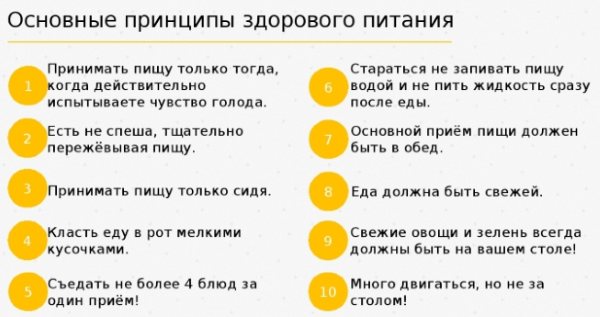
Breakfast products:
- 2 boiled eggs;
- 1 orange/grapefruit;
- Tea coffee.
Lunch product:
- 1 boiled egg;
- orange;
- 100-150 g boiled chicken.
Products for dinner:
- 200g chicken;
- 200 ml kefir.
Products for the second day of the diet:
- for breakfast: 2 eggs and 200 ml of citrus juice;
- for lunch: 2 oranges, 150g chicken fillet, a glass of water;
- for dinner: 2 chicken eggs, 200 ml of milk/kefir.
Menu for the third day of the diet:
- for breakfast: 1 boiled egg and a glass of mineral water;
- for lunch: 200 g of boiled red meat;
- for dinner: 2 boiled eggs.
List of products for the fourth day:
- for breakfast: omelet and tea;
- for lunch: 200 g chicken fillet;
- for dinner: 1 boiled egg and orange.
Menu for the fifth day:
- for breakfast: a salad of vegetables and 2 eggs, you can use a little sour cream and tea as a dressing;
- for lunch: a glass of fruit juice, 2 carrots;
- for dinner: 200 g of boiled fish, boiled egg.
Menu for the sixth day of the diet:
- for breakfast: 150 g of cottage cheese and 200 ml of juice;
- for lunch: 2 oranges and 2 boiled eggs;
- for dinner: 1-2 glasses of mineral water.
Menu for the seventh day:
- for breakfast: 2 boiled eggs;
- for lunch: 200 g of boiled meat;
- for dinner: 1 glass of mineral water.
During the diet, you must drink at least 2 liters of clean water per day.
The diet involves eating large amounts of citrus fruits because they help break down fats. But besides this, citrus fruits (especially grapefruit) suppress hunger.
During the diet, it is recommended to consume vegetables and other foods containing fiber to maintain proper bowel function and improve peristalsis. After all, excluding carbohydrates from the diet can lead to disruption of the gastrointestinal tract. Vegetables are allowed to be heat treated. You can make salads from vegetables, but without using any dressing.
In the egg diet, it is allowed to replace eggs with another protein product . For example, 1 egg can be replaced with 150 g of cottage cheese or 150-200 g of boiled red meat or 200 g of poultry or 150-200 g of ocean (sea) fish.
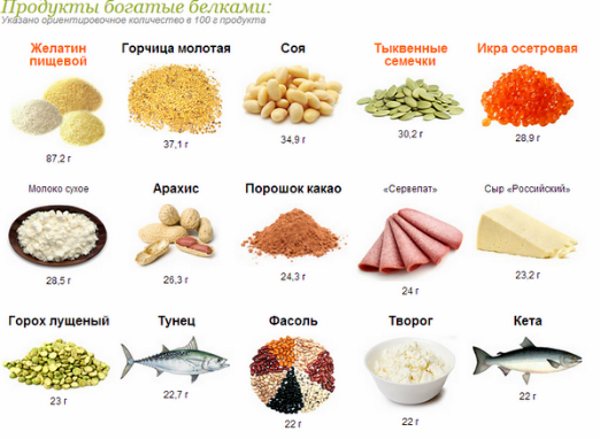
The egg diet increases kidney function, so it is not recommended for people with diseases of the genitourinary system. Women during lactation should also abandon the diet. A diet dominated by chicken eggs is not suitable for people with allergies to protein and/or citrus fruits.
You should start the diet only with the Monday menu, regardless of the day of the week. If for some reason it was not possible to adhere to the diet during the week, then the diet should be started again, with the Monday menu. But if your health worsens, it is better to return to your usual diet.
Chicken egg and weight loss
A chicken egg, with an average calorie content of about 160 kcal, is quite acceptable in a diet designed for a person who wants to lose weight.
Eating eggs for weight loss is beneficial for several reasons:
- eggs give a long-lasting feeling of satiety;
- proteins do not turn into fats during metabolism;
- have an average calorie content for an animal product.
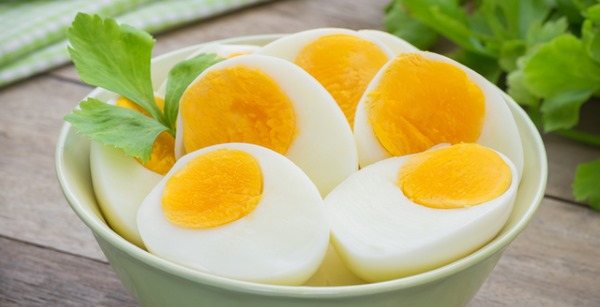
Eggs are quite acceptable for consumption in the process of losing weight, because they are a source of protein necessary for the “building” of muscle fibers.
Diet features
A mono-diet on eggs is effective because it helps to reduce up to 7 kg per week. Everything is explained by its low calorie content, but due to its special composition, certain recommendations for weight loss should be followed.
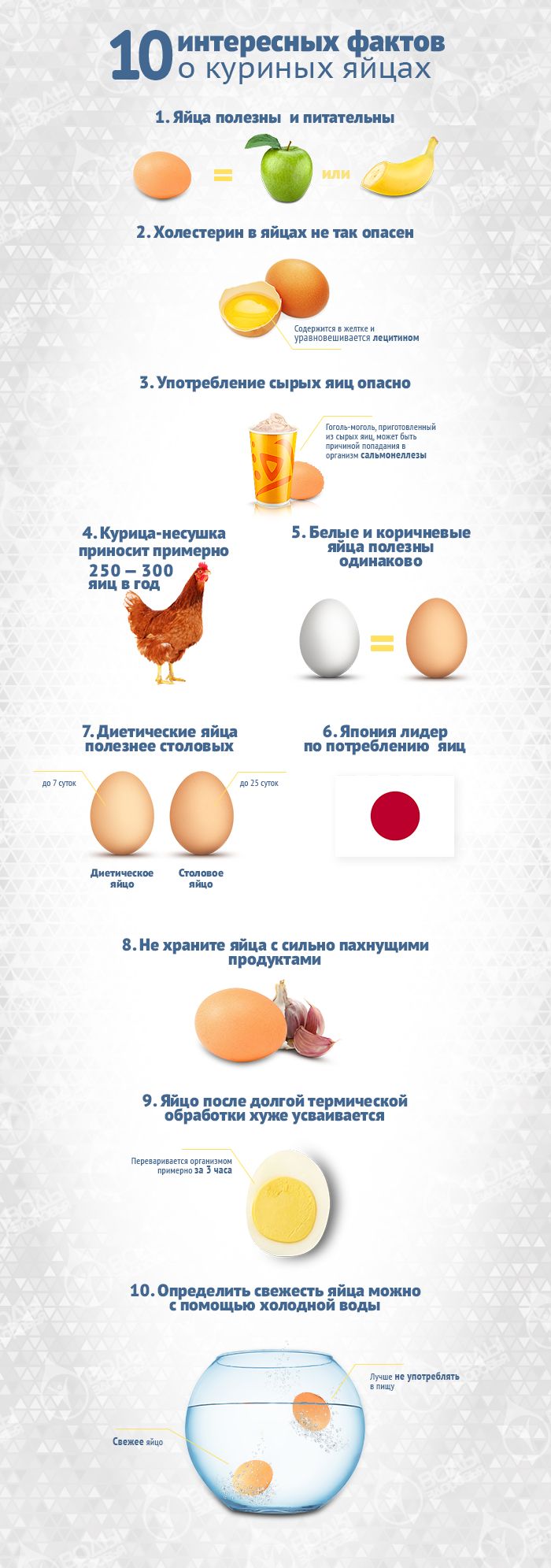
The basic rules include the following:
- You can reduce the calorie content of foods consumed per day by 300 kcal if you replace breakfast with two boiled eggs;
- for large consumption of eggs, it is recommended to abandon the yolk - the whites will not cause much harm to the body;
- The product is recommended to be consumed boiled for snacking;
- When eating large amounts of protein, you should drink more fluid.
- Check the freshness of the product before use.
We recommend that you familiarize yourself with the egg diet for 4 weeks.
Eating protein can negatively affect kidney function. Therefore, during a diet when chicken eggs are consumed to a greater extent, it is recommended to drink more drinks with a weak diuretic effect - green tea, rosehip decoction and just water.
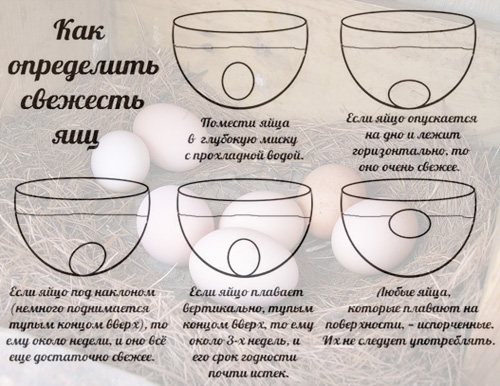
Beneficial features
The health benefits of eggs are recognized all over the world. Their use has a beneficial effect on men's and women's health.
The main useful properties include:
- Availability of easily digestible proteins. In this case, 1 egg has 15% of the daily requirement. In addition, the composition contains protein (6 g). Thus, almost 10% of weight is spent on providing energy to the body.
- Due to the high protein content and regular consumption, people have a more developed muscular system.
- Protein allows you to forget about the feeling of hunger for a long time, which is especially important during diets.
- Lecithin is useful for pregnant women because it ensures normal development of the fetal brain.
- Animal fats that are included in the composition have a positive effect on the male reproductive system.
- Vitamin D helps the body better absorb calcium, which helps maintain good condition of bones, nails, and teeth.
- Selenium improves the body's protective functions and also normalizes the functioning of the thyroid gland.
It is also worth noting that fresh eggs bring maximum benefits to the body. And there are several methods to check their condition. If you shake the fresh product, no sounds will be detected. You can also put it in water. If it sinks right away, it means it’s fresh.
Acceptable consumption standards
To provide your body with enough nutrients, it is recommended to eat 1 piece. per day. However, this is only possible if the level of cholesterol in the blood is normal. If the indicators are elevated, the amount of product is reduced to 2-3 per week. Eggs can be introduced into the diet of babies from 7 months. At first, it is recommended to give only yolks. For children 2-3 years old, the norm is 2-3 yolks for 7 days. When creating your menu, you must also take into account the fact that eggs are contained in many products, in particular baked goods, mayonnaise, etc.
Benefits of eggs
The benefits of natural chicken product include the following factors:
- easy digestion of protein - according to numerous studies, it has been found that egg white is much safer than meat white;
- protein is the building material of muscles, so people who regularly eat eggs and play sports can boast of strong muscles;
- the product contains protein - it provides satiety while maintaining weight;
- the yolk contains lecithin - it must be consumed in large quantities by women during pregnancy, since this product promotes the development of the fetal brain;
- animal fats contained in the yolk help improve male sexual function;
- protein helps strengthen hair and prevents the formation of dandruff;
- fatty acids contained in the yolk tone the muscles of children;
- chicken eggs prevent the development of cardiovascular diseases;
- contains provitamin A - it has a detrimental effect on the cells of a developing infection or virus;
- vitamin D has a positive effect on calcium absorption;
- Choline contained in the composition promotes lipid metabolism and has a positive effect on liver function;
- the lutein contained in the composition is beneficial for vision - it prevents the development of cataracts;
- Selenium helps normalize the functioning of the thyroid gland and strengthens the immune system.
Video
Despite the small number of kilocalories, the product should not be abused. Consumption should be limited if you have diseases of the kidneys, liver, gall bladder, or high cholesterol - here you are allowed to eat no more than 2-3 pieces per week. Before going on a mono-diet with only eggs, it is recommended to consult your doctor.
Quail
Having figured out how many kcal are in 1 chicken egg, you can move on to other types of this product. Quail eggs are also in demand because they contain a large amount of vitamins, microelements and amino acids. At the same time, doctors do not indicate contraindications to their use. On the contrary, this product is recommended for gastrointestinal diseases. Its beneficial properties also include normalizing blood pressure. The product has an energy value of 168 kilocalories.
Video

